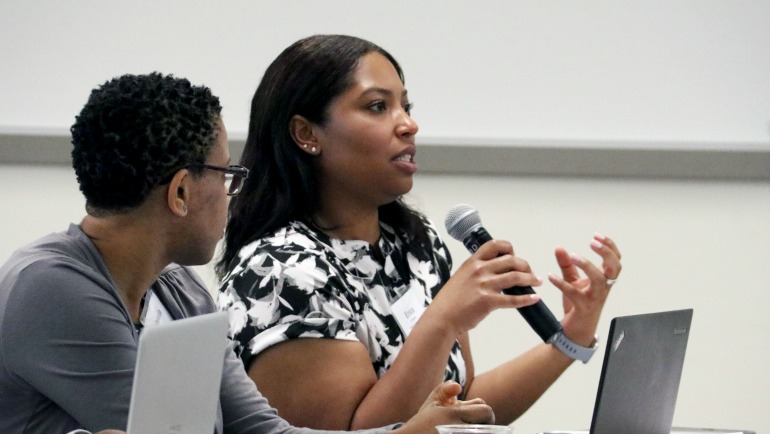$3.5 million grant renewal to University Research Corridor member universities marks 25 years of research and scholarship on minority aging and health

DETROIT — The Institute of Gerontology at Wayne State University, in partnership with the Institute of Social Research at the University of Michigan and the College of Human Medicine at Michigan State University, received a $3.5 million grant renewal from the National Institutes of Health’s National Institute on Aging to extend the Michigan Center for Urban African American Aging Research (MCUAAAR). Continuously funded since 1997, MCUAAAR will expand its work through 2023. MCUAAAR is one of 18 Resource Centers for Minority Aging Research across the nation tasked with improving the health of older minorities through research, scholarship and education. The University Research Corridor (URC) is an alliance of Michigan’s three leading research institutions: Michigan State University, the University of Michigan and Wayne State University. The URC plays a key role in leveraging the intellectual capital of its three public research universities.
African Americans have significantly higher rates than Caucasians of diabetes, stroke, heart disease, high blood pressure and certain cancers as they age. MCUAAAR scholars investigate causes of and ways to prevent these health disparities. James Jackson, research professor at the Institute for Social Research, is the grant’s principal investigator and, along with co-PIs Joan Ilardo of Michigan State University and Peter Lichtenberg of Wayne State University, directs all aspects of MCUAAAR’s activities. “MCUAAAR has operated as a resource for the Detroit older community for over 20 years,” Jackson said. “It has assisted in transforming innumerable lives of community dwelling elders of color and faculty members at Wayne State and the University of Michigan in the process. We are very pleased that MSU will be joining us this year to begin expanding our work to Flint and MSU at Flint.”
According to Lichtenberg, director of the Institute of Gerontology at Wayne State, MCUAAAR is a catalyst for widespread change. “It has two major aims,” he said. “Increase the number of diverse junior faculty working in aging and health research, and partner with older African Americans in meaningful ways to improve health and well-being.”
Mentoring exceptional scholars is key to MCUAAAR’s lasting success. Scholars are chosen yearly and matched with an experienced mentor to conduct pilot studies, present research findings and publish journal articles.
Major MCUAAAR achievements:
- More than 60 minority pilot scholars (70 percent African American) have completed MCUAAAR training.
- Two-thirds of these scholars are ow tenured university professors.
- The most recent 15 scholars published more than 200 research papers and are investigators on 92 grants totaling $60 million in funding.
- MCUAAAR maintains a database of about 1,300 older African Americans in Detroit willing to volunteer for research, and plans to extend this opportunity to older African American adults in Flint through Michigan State University.
- The Healthier Black Elders Ceter (HBEC), under the leadership of MCUAAAR, provides educational programs and health screenings to about 2,400 older African Americans each year.
Many persons who attend HBEC events become willing to participate in research, an important achievement considering African Americans and other minorities have long been underrepresented. HBEC encourages involvement by building long-term connections, partnering with trusted organizations, and providing free educational and health workshops by research experts. All MCUAAAR research projects are approved by HBEC’s 15-person Community Advisory Board before participants can be recruited, which assures a person- and community-based perspective rooted in the goals and values of the initiative.
“Our biggest challenge with this fifth round of funding was to continue our extraordinary momentum,” Lichtenberg said. The grant renewal expands the work into the Flint area in partnership with Michigan State University under the leadership of Ilardo, director of research initiatives of the MSU College of Human Medicine.
”Michigan State has extensive programs in Flint through the College of Human Medicine’s Division of Public Health, the School of Social Work’s master’s degree program, and Cooperative Extension workshops and training that promote health and well-being,” Ilardo said. Research into the health of Flint’s older minority residents is critical. Nearly 40 percent of Flint residents live below the poverty line, and the area ranks high in environmental toxins from abandoned industrial sites. “Being part of MCUAAAR provides an avenue for us to expand our work with Flint’s older adults as we establish a Healthier Black Elders Center in Flint based on the successful Center in Detroit.”
For each university partner, the determination to achieve is palpable. “In the past 20 years, we’ve made a profound, sustainable improvement in minority research and scholarship,” Lichtenberg said. “But no one is resting on previous accomplishments. Until health disparities vanish, our mission continues.”
The grant’s NIH National Institute on Aging award number is 2P30AG-15281-21.
The Institute of Gerontology researches the aging process, educates students in gerontology, and presents programs on aging issues relevant to professionals, caregivers and older adults in the community (www.iog.wayne.edu). The Institute is part of the Division of Research at Wayne State University, one of the nation’s preeminent public research institutions in an urban setting. For more information about research at Wayne State University, visit research.wayne.edu.
Michigan’s University Research Corridor (URC) is one of the nation’s top academic research clusters and the leading engine for innovation in Michigan and the Great Lakes region. An alliance of Michigan State University, the University of Michigan and Wayne State University, the URC is focused on increasing economic prosperity and connecting Michigan to the world.